Chinese dreams on Native American land: A tale of cannabis boom and bust
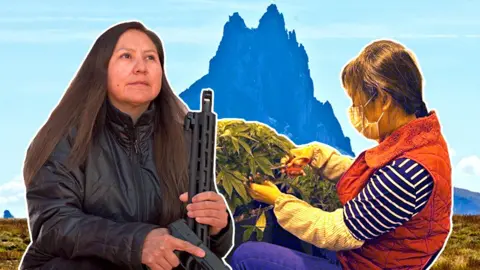 BBC
BBC
In the pandemic, hundreds of Chinese migrants who lost their jobs moved to a remote city on the Navajo Nation Indian reservation in New Mexico, to do what they thought was legal agricultural work. Instead, they and the local Native community found themselves pitted against one another in a bizarre cautionary tale about the boom in cannabis production in the US, and the impact on Asian migrant labourers.
When Xia (not her real name) first heard about the job as a "flower cutter", she pictured roses.
Details were scant, but a roommate told her it was 10 days' work for $200 a day, room and board included. Unemployed in the pandemic and unable to send money back to her adult children in southern China, Xia had been living at one of the crowded boarding houses common in the large Asian immigrant enclave of LA's San Gabriel Valley. The job sounded like a fine temporary solution.
In early October, Xia and five other women made the 11-hour drive to the outskirts of Farmington, a small city nestled in the stunning but sparsely-populated high desert of northern New Mexico. When they arrived, their new boss checked them into a bright pink, roadside motel called the Travel Inn.

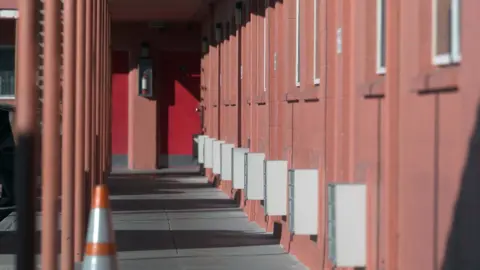 BBC
BBC
In a series of rooms on the first floor, Xia and her co-workers sat in chairs around heaps of plant material that were delivered by rental van in the night, trimming the "flowers" off the top. These were definitely not roses - the fan-leafed plants reminded Xia of àicǎo, or silvery wormwood, which the Chinese burn to ward off mosquitoes. The piles smelled so strongly that the odour hung around the motel like a cloud.
But for the moment, Xia was content. A convivial middle-aged mother of two, she had worked many jobs since arriving in the US in 2015 - home carer, nanny, masseuse. This was a lot less lonely.
"I was happy. I could talk to other people at work," she recalls in Mandarin. "I much prefer cutting flowers."
Just three days into their work, there was a knock at the door. Xia assumed it was someone calling them to dinner, until she saw men in uniforms with badges. Initially, it was impossible to communicate, until an officer who spoke Mandarin arrived. He asked the workers if they knew what kind of "flowers" they were cutting. One by one, they shook their heads.
"I wasn't afraid. I thought, 'I didn't commit any crime,'" recalls Xia. "When they put the handcuffs on me, I realised it's serious."
As a police convoy drove the workers to jail, someone attempted a joke: "Hey, we are almost 60 years old, and it's our first time being handcuffed and riding a police car!"
With no translators to help communicate with law enforcement or her court-appointed lawyer, Xia says that for days she did little more than sit on her bunk and cry. She assumed the worst: that whatever she'd done would land her in prison doing hard labour, and she would never make it back home.
"I thought, 'My life is over,'" she says. "I thought of my son, and that he wouldn't even know if I died in America."

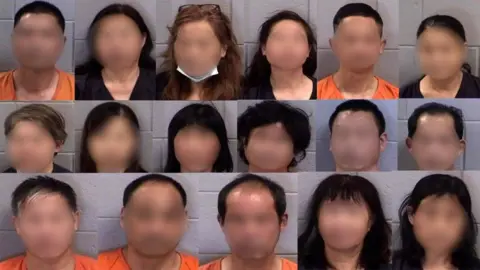 BBC
BBC
Meanwhile, her mugshot and those of her co-workers were all over the local news. They'd been charged with multiple felonies for trafficking, conspiracy and intent to distribute a controlled substance: high-grade marijuana.
 BBC
BBCWhat Xia did not know was that over the summer, about 30 minutes up the highway from the bright pink motel, a massive marijuana farming operation had sprung up in the tiny town of Shiprock on the Navajo Nation reservation. Hundreds of Asian migrant workers like herself had flocked there from all over the US to live and work on the farms, having lost their jobs due to the pandemic.
It was part of a recent, surprising expansion of Chinese-American investment into the US cannabis industry. Investors sought to recoup losses from shuttered restaurants, spas and tourism businesses by ploughing millions into cannabis - all despite the fact that marijuana remains a social taboo in the Chinese immigrant community.

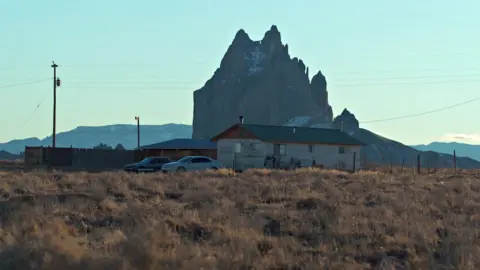 BBC
BBC
While hardly the only minority community interested in cannabis, in rural parts of the US, the Asian workforce stood out. This set the stage for a bitter fight with locals on the Navajo Nation, where unscrupulous entrepreneurs took advantage of the complex and confusing laws governing the industry, and set the farms on course for disaster.
"Everybody at one time was for the hemp because they lost their jobs in the pandemic," recalls one Navajo Nation resident. "And then all of a sudden things changed... I think it turned everybody against one another."
 BBC
BBCThe view from the top of Bea Redfeather's property on the Navajo Nation is breathtaking and severe. To the southwest is the cathedral-like Tsé Bitʼaʼí, or Shiprock pinnacle, a giant rock which rises nearly 1,580ft (480m) from the desert floor. Redfeather, a petite, 59-year-old tax accountant and silversmith, has lived here almost 30 years.
"This was peaceful," she says, looking out over the horizon. "Calming."

 BBC
BBC
All that changed in early June, when Redfeather saw an enormous lorry jostling down the narrow frontage road that separates her property from her neighbour's. A group of men got out and started unloading equipment into the empty field.
It astonished Redfeather that on a reservation where new development is tightly controlled by tribal bureaucracy, a large-scale farming operation was going up across the street without her even hearing about it. The Navajo Nation was also struggling with a severe coronavirus outbreak, one of the worst in the country, and movement on and off the reservation was supposed to be tightly controlled.
She decided to record what was going on on her phone.
"They're like, 'What are you doing here?'" she recalls. "These are non-Natives. So of course, I fired back saying, 'What are you doing here? You guys aren't allowed here.'"

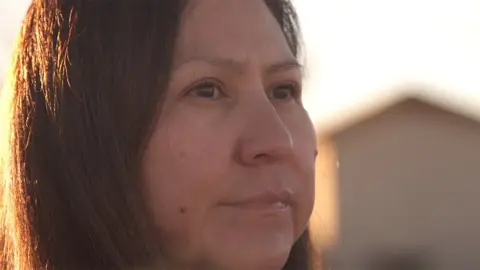 BBC
BBC
Not long afterwards, Redfeather says that San Juan River Farm Board president Dineh Benally drove up, and came over to speak to her. She says he asked her how they could resolve the situation.
"I says, 'I'm going to stop you and what you're doing.' And you could see it in him. He was angry," she recalls.
Benally, a former civil engineer for the Bureau of Indian Affairs and the eldest son of a formidable tribal politician, was well known for his ambition to introduce the profitable cultivation of hemp and marijuana on the reservation.
New Mexico legalised medical marijuana back in 2007, but state laws have no bearing in Indian country, which is governed by federal and tribal law. In 2017, Benally lobbied hard for a bill that would have legalised medical marijuana in the Navajo Nation. He called his efforts a "crusade" in memory of his late mother, who died of pancreatic cancer.

 Twitter
Twitter
"Her last four months of her life she suffered," he told the tribal council, according to the Navajo Times. "She didn't have the medication to have a better part of life."
The bill, however, was withdrawn before it ever came to a vote.
Benally saw another way into the industry after the 2014 and 2018 Farm Bills made it legal to grow industrial hemp. Like marijuana, hemp comes from the cannabis plant, but it contains almost no THC, the psychoactive compound that causes a user high. However, before hemp can be farmed, the state must first create a system to regulate production, including a way of testing THC concentration. Benally tried to convince the Navajo Nation leadership to do this so that the tribe could begin generating much-needed income from textiles and CBD oil products. But the council never showed much interest.
The same year the medical marijuana bill stalled, Benally ran unopposed for the San Juan Farm Board, an entity with limited powers over farming permits on the reservation. This new position, Benally apparently believed, gave him the authority to approve his own hemp "pilot project".
Through his lawyer, Benally declined to be interviewed for this story or to provide a statement: however, he has previously strongly denied any breach of the law.

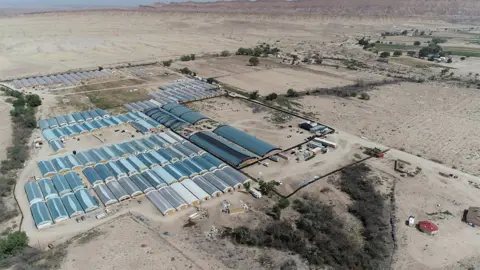 Navajo Nation Police Department
Navajo Nation Police Department 
"The Navajo - we have the land and the water. We need an entity to help us hit the ground running," he told a reporter in 2019, boasting that he already had 100 acres of hemp growing on his property.
Around this time, a friend of Benally's introduced him to Irving Lin. An irrepressible 70-year-old who immigrated decades ago from Taiwan, Lin made his fortune in California real estate but has no interest in an idle retirement. His enthusiasm for Chinese investment in marijuana is tempered only by his wife, whom he says will not allow him to profit directly from the sale of marijuana. Instead, he runs informational seminars in Los Angeles - mostly for Asian American business people drawn to marijuana cultivation as a way to bolster their flagging business portfolios.

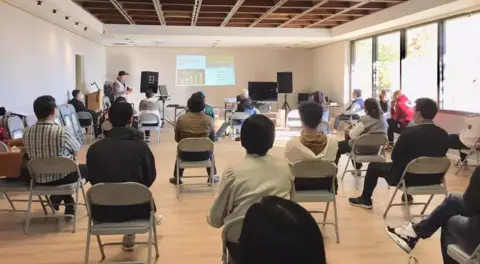 BBC
BBC
"This is very good for our Chinese people to go into," he says. "I think cannabis sooner or later will be one of the Chinese major businesses."
Lin remembers Benally explaining that the Navajo Nation was a sovereign country, and that he could "control their decision". Lin began acting as matchmaker between his seminar participants and Navajo landowners who were interested in subleasing to the Chinese. This eventually amounted to millions of dollars in investment. These newly-minted farmers started going to their networks of family and friends to find labour.
"Suddenly so many people go there. Every day people are looking for a house, looking for land in a very short period. In six months, we had 1,000 people go there."

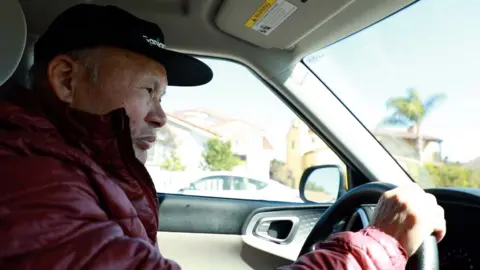 BBC
BBC
Bea Redfeather was seeing the results at her doorstep. Twenty-five "hoophouses", inexpensive greenhouses made of steel frames with heavy-duty plastic covering, appeared seemingly overnight next door. Some farms that had previously grown traditional Navajo corn varieties now had hundreds of hoophouses, lined up in neat rows that stretched to the horizon.

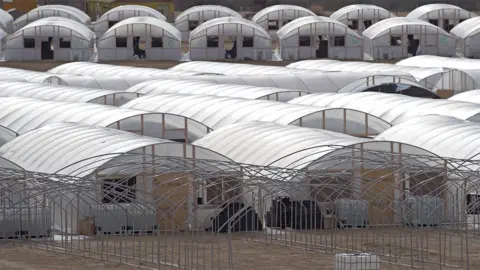 BBC
BBC
"Corn is a sacred plant," Redfeather told Searchlight New Mexico, the first media outlet to do an in-depth investigation into the farms. "You can't eat hemp and marijuana."
Redfeather became obsessed with documenting the growth of the hemp farms in Shiprock on her Facebook Live. Her videos show heavy machinery grading the fields, trailer homes arriving on the back of trucks, and septic tanks being dug into the ground - the kind of major redevelopment that would normally take years to get approved. Before long, the air all around Shiprock hung with the smell of marijuana.

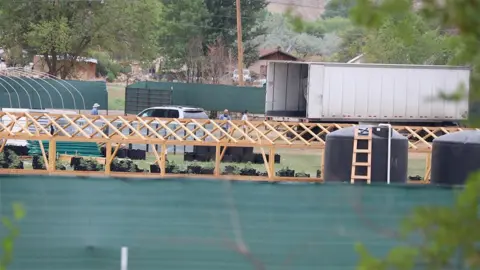 Bea Redfeather
Bea Redfeather
The Navajo Nation police had been watching Benally, too. They suspected the "hemp" that he had been growing on his own land was actually marijuana. But according to Navajo Nation Police Chief Phillip Francisco, to shut him down, they had to prove that his crop's THC levels were higher than 0.3%. With no drug lab of their own, Navajo police sent samples to an outside agency.
While the Navajo police waited, the pandemic hit.
"After Covid started, we started seeing a lot of these farms spring up fast," says Francisco, who had only 180 patrol officers trying to enforce health mandates over a 27,000sq-m (70,000 sq-km) reservation. "I think that's what he took advantage of."
The situation was yet another example of just how complex law enforcement in Indian Country can be. Benally's interpretation of tribal hemp laws got his farms started. Meanwhile, because so many of the workers showing up in Shiprock were non-Native, the tribal police had no authority to charge them with anything. Similarly, the San Juan County Sheriff and the Farmington Police Department had no jurisdictional power on the reservation or over Native workers.
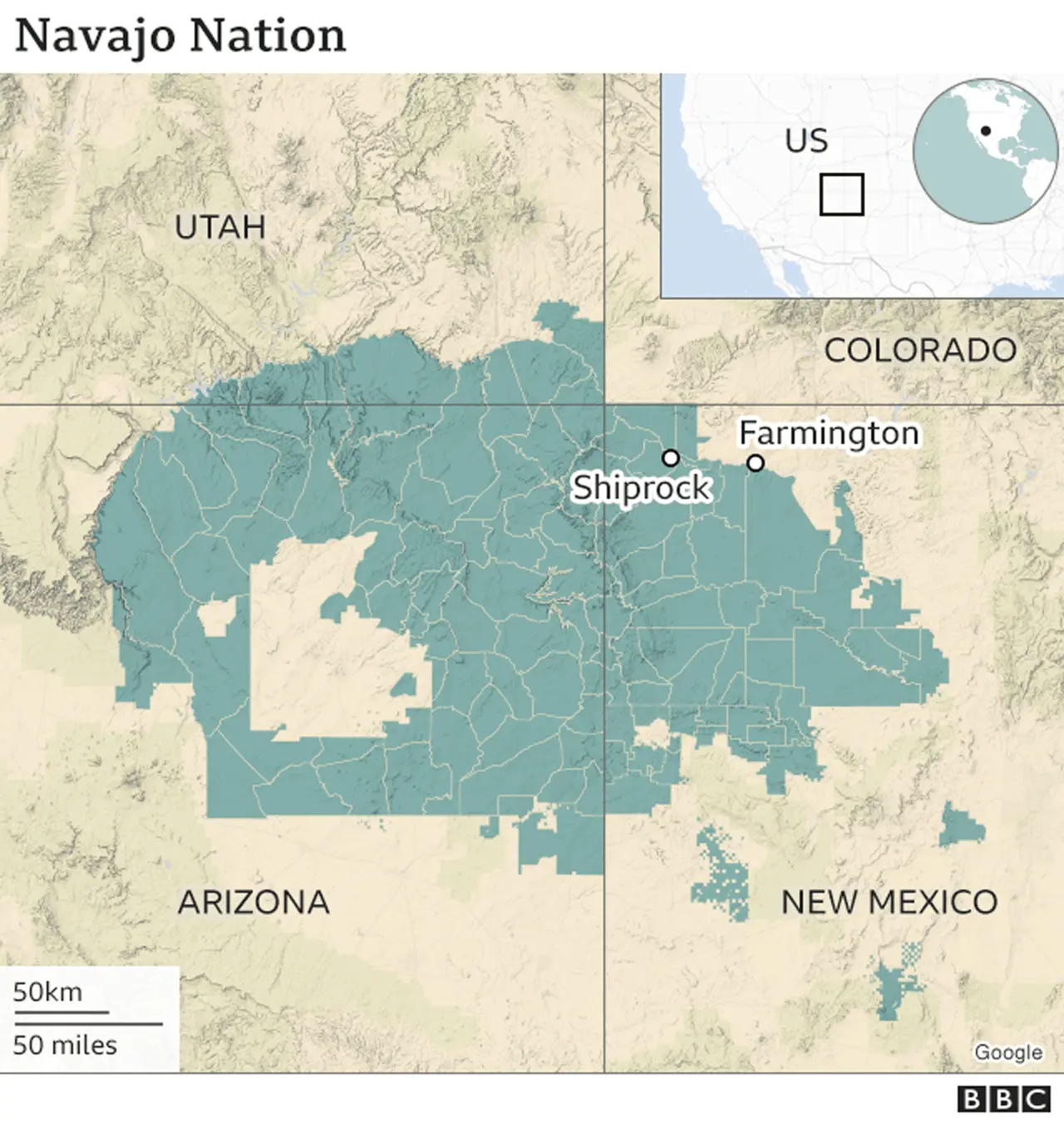 BBC
BBCThe next step would be to involve federal authorities like the Bureau of Indian Affairs or the FBI - but they have limited staffing and can be notoriously slow to respond.
The farms continued to grow throughout the summer, until there were 36 hemp operations in total.
"I've never seen anything like that in my 22-year career," says Chief Francisco. "Never would we have worried about this magnitude of an operation, right under our noses."
When Navajo police responded to complaints, the workers told them they had permission from the landowners to farm there - it turned out that 33 Navajo farmers had signed agreements to sublease their land to people like Benally, and Chinese investors. Like the migrant workers, many Navajo were suffering income losses during the pandemic, and these non-Native investors were paying cash. The farmers provided official-looking "provisional cannabis cultivation" licences, issued by Benally's farm board.
"We said yes to hemp when [we thought it was] legal," one landowner told the BBC before hanging up.
For Redfeather, the final straw came one morning when a worker from the nearby hemp farm gestured threateningly with what looked like an AK-47 at her mother, who was sitting on their porch drinking coffee.
"I was angry. Really, really angry," she says. For protection, she bought a rifle of her own.

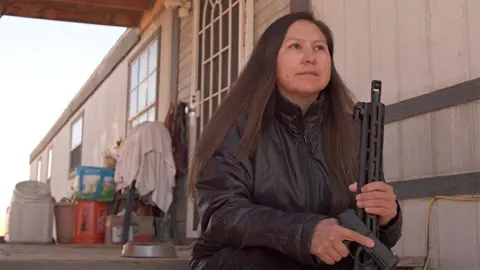 BBC
BBC
Using her new-found social media capital, Redfeather began organising protests against the hemp farms. They called themselves Kéyah - or land - Protectors. In the first protest, roughly 100 Shiprock residents shut down a road through town carrying signs that said things like, "We Don't Need Chinese to Farm" and "Hemp is Not the Navajo Way". A young boy on a microphone shouted, "No Asian invasion!"
"This is in no way a racial issue," one resident told the Navajo Times, which broke many of the earliest stories about the unfolding disaster. "They use all our resources within the community starting with the land, water and people… That's not right."
The protests led to tense confrontations between anti-hemp Navajo residents and the Navajo farm owners who had sublet their land for hemp.
"You're a traitor!" protesters yelled at a farm owner across the gate in one particularly heated demonstration.

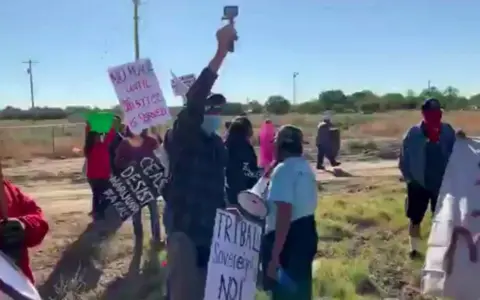 Bea Redfeather
Bea Redfeather 
In another video, Redfeather comes face-to-face with a tall, barrel-chested young man in a tactical vest and a skull face mask pulled over his nose and mouth.
"Isn't your dad a medicine man?" Redfeather shouts at him as he blocks her path on to the farm.
The young man - 25-year-old Brandon Billie - didn't particularly mind these confrontations. As Dineh Benally's head of security, Billie liked the excitement of chasing thieves and vandals off the farms. More importantly, it was steady work at a time when jobs were scarce.

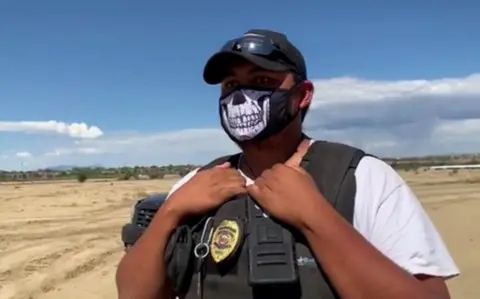 Bea Redfeather
Bea Redfeather
"He hired anybody who was willing to work," Billie says. "The income was low and all that. But it was something. It was a job."
As threats to the workers became more frequent, Billie moved into a mobile home alongside the Asian workers. He communicated with them using translation apps and says they hosted cookouts together. The Chinese made spicy noodles and roasted a whole pig's head for the Navajo workers. The Navajos cooked fry bread, mutton stew and blue corn mush in return. Billie started to dream about one day visiting his new friends' hometowns in China.
"I called them my brothers and sisters," he says.
But the job was causing problems at home. Although his father initially supported his son's work in hemp, that position became untenable as public opinion turned against the farms. When Billie told his family that he had too much riding on the farms to quit, his father cut off communication.

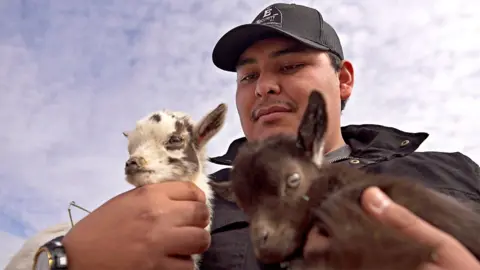 BBC
BBC
On the frigid morning of 9 November, Billie had just made a cup of coffee and was about to go back inside his trailer when he heard a loud thud. He turned to see police vehicles crashing over a small dirt hill towards the camp. He says officers jumped out with AR-15s pointed at him, handcuffed him and put him into the back of a state trooper's vehicle.

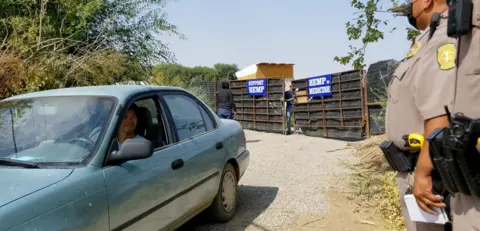 Navajo Nation Police Department
Navajo Nation Police Department
The same dramatic scene was playing out on farms all over Shiprock. After weeks of planning, a massive task force had finally mobilised, including dozens of officers from Navajo, state and local police, as well as agents from the FBI, the Drug Enforcement Administration, Homeland Security and the Environmental Protection Agency.
Over the course of three days, "Operation Navajo Gold" tore through the farms and seized crops. They quickly proved what everyone already knew: the farms were full of marijuana, not hemp. Agents recovered 60,000lb (27,215kg) of it on 21 farms and in two private homes. In one greenhouse, they found 1,000lb (450kg) of fully-processed marijuana already placed in baggies for individual sale.

 BBC
BBC
Billie and dozens of farm workers were transported to the gymnasium of Shiprock High School. In the same room where the principal had handed him his high school diploma, Billie was grilled by an FBI agent about what he knew about Benally's operation.
Unlike the workers from the Travel Inn, no-one was arrested. The labourers were met by several Mandarin translators from the FBI, and Lynn Sanchez, from the New Mexico Human Trafficking Task Force. It was her job to provide services to the workers now that their homes and job sites had become an active crime scene.
"They looked very scared," says Sanchez. "I just remember looking at this older man, he had to be about 65 or older than that. He had tears in his eyes that just wouldn't fall."
The task force and another organisation called Life Link were able to provide funds for travel and compensation for lost wages to a few dozen workers.
Others simply disappeared. Chief Francisco says in the first days after the raid, he heard reports of Asian workers trying to hitchhike and sleeping rough.

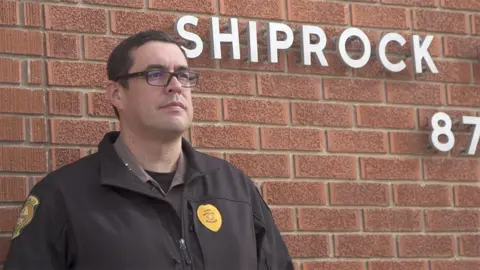 BBC
BBC
Sanchez says that the conditions she saw on the farms, with some sleeping outdoors or on wooden pallets, without access to proper sanitation or medical care, were clear signs of labour trafficking. However, applying the "trafficking" label is complicated, both in a legal sense and for the workers themselves, no matter how squalid the conditions.
"In the informal economy, it might be completely exploitative and it doesn't mean that person is not choosing to do this," says Erin Albright, founder of New Frameworks, an anti-trafficking organisation. "There are no other options for them."

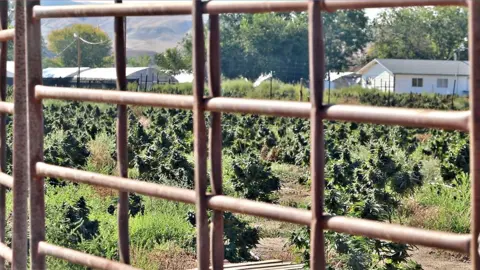 Navajo Police Department
Navajo Police Department
Sanchez found that some of the workers did not accept that they were "victims" and declined her assistance.
"It was by mutual consent," one 36-year-old worker told Initium Media, a Hong Kong digital magazine that interviewed many of the Chinese workers in Shiprock. "No-one forced me to do anything."
Sanchez and her organisation were also told by a public defender that the 17 workers from the Travel Inn motel were still somewhere in Farmington. They found Xia and her five friends sharing another cheap motel room. After their release from jail, a judge told the flower cutters not to leave New Mexico. They'd been holed up in the room for 10 days, unsure of what to do next, living on nothing but plain rice porridge.
By that point, however, the county prosecutor had been convinced that the women had not knowingly been part of a drug cartel. He dropped the charges. Using funds from Sanchez's trafficking task force, Xia and her friends drove back over the mountains to California.
When her children in China asked why they hadn't heard from her in so long, Xia lied.
"I told them my mobile phone was broken. If they know the truth, they'd be worried," she says.
"Thinking back," she adds, "it's like a nightmare."
Back in the boarding house, Xia was able to rest for a few weeks. But there was still no work and coronavirus case numbers began to surge once again in Los Angeles.
She heard from her friends that some workers had gone directly from the Shiprock farms to ones in Oklahoma - the latest frontier in the marijuana gold rush. A friend told Xia she could get a job with her in a massage parlour, and after that, maybe they could go back to farm work.
"All jobs are tough," she remembers thinking. "I still need to endure, to make a living and to support my family."
So once, again, Xia packed her things and drove off towards the unknown.

 BBC
BBC
 BBC
BBCOklahoma City's Asia District is a roughly 10-block stretch of Chinese grocery stores, bubble tea shops and restaurants, dotted on either side of a busy four-lane thoroughfare. Near its centre is the Fujianese Association of Oklahoma, which opened its doors in late 2020.
In a room decorated with Chinese and American flags, men play mahjong at two tables as others stand around watching. The air is thick with cigarette smoke, the sound of clinking mahjong tiles, and occasional bursts of laughter and cursing.

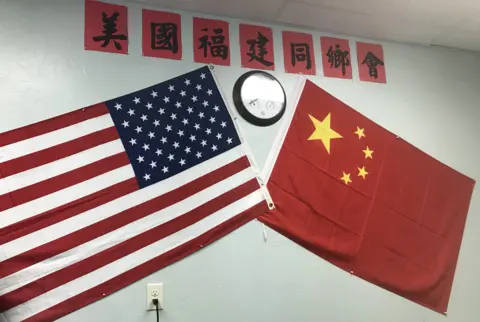 BBC
BBC
Dressed in T-shirts, jeans and sneakers, the men range in age from their 30s to 60s. One of them says they are mostly restaurant entrepreneurs who'd moved to Oklahoma to take part in the booming marijuana industry.
According to Irving Lin, at least a dozen Chinese investors he knows took their workforce and what little they could salvage from the New Mexico farms straight to Oklahoma.
"You stopped me in New Mexico. I immediately go to Oklahoma," Lin says. "So what? Next!"
Others were not so lucky. One California investor told the BBC that she'd lost all her savings and the home she put up as collateral.
Some of the luckier investors were at the Fujianese Association, but none would speak about their experiences in New Mexico. Asked directly by the BBC, a few only smile politely and shake their heads.
"What is cannabis?" one player asks with a cheeky smile. "None of us knows anything about it!"
Eventually, a sophisticated-looking man in a long wool coat - a single AirPod hanging from one ear - arrives at the club. He says his name is Michael, and though he wasn't involved in the Shiprock venture, he is well aware of the debacle. He points out three men puffing cigarettes at one of the tables, and says he knows they lost their investment there.

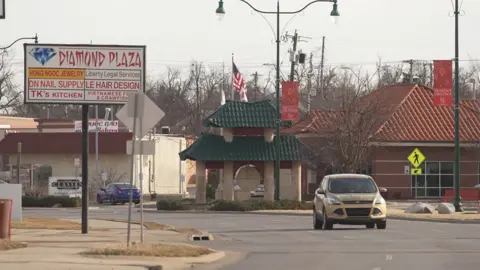 BBC
BBC
"You can try," he says softly in Mandarin, "but I don't think they'd talk to you about New Mexico."
Later, in a conversation over the phone, Michael explains that the investors involved in Shiprock are embarrassed for having unknowingly broken the laws and suffered financial losses. Besides, many in the Chinese community still consider marijuana a dangerous narcotic drug, and the men are not eager to discuss it with reporters.
At the beginning of the pandemic, Michael, who's in his 50s, saw the economic fallout coming and sold his three acupuncture businesses on the east coast. He came to Oklahoma in June, after convincing a few Fujianese friends to pool their money. He says they now own several legal cannabis-related businesses, including a farm and an agricultural equipment store, even though he says he's never even smoked marijuana.
Michael says most of his workers are Fujianese restaurant workers who came from all over the country, landing them - improbably - at the buckle of the Bible Belt, in a state better known for its cowboy history and staunchly Republican politics.
"If it weren't for the pandemic," says Michael, "I'd have never come here."
Since legalising medical marijuana in 2018, this socially conservative state has rapidly become the country's hottest weed market due to its hands-off regulatory approach. The cost of obtaining a cannabis licence in Oklahoma is just $2,500, compared with tens of thousands of dollars in other states. The state also has no cap on how many licences can be issued.
As a result, it's in the midst of a "green gold rush", says Matt Stacy, an Oklahoma City attorney who helps clients secure cultivation licences. He estimates he has about 300 Chinese clients.
"I didn't expect it," he says. "It grew quickly."

 BBC
BBC
Though the cost of entry is low in Oklahoma, the cannabis business is by nature extremely capital and labour intensive. The Chinese immigrant community in the US has both resources, on a large scale.
Recruitment is often done through word of mouth, cannabis groups on Chinese messaging app WeChat or sometimes through hometown associations like the Fujianese social club. There are also employment agencies in Chinatowns across the US, matching Chinese-run businesses with low-wage immigrant workers.
In a state where the Asian population is about 2%, the newcomers haven't gone unnoticed. Jayne and Vic Grissom obtained one of Oklahoma's first cultivation licences in 2018 and run a small, sleek dispensary outside Oklahoma City. Last August, when a group of Chinese men purchased an 80-acre plot and built a huge farming compound across the street from their home, the couple was surprised.
"Oklahoma is not a very diverse state," Jayne explains. "To have that many Chinese coming in, especially where we are, which is really rural, I just found it really bizarre."
The couple - who grow three shipping containers of "craft cannabis" with names like 66 Cookies, OK Boomer, Spicy Berry - are concerned that these new, large-scale growers will flood the market with product or begin shipping it illegally across state lines to sell. It is only legal to grow marijuana for consumption in Oklahoma.

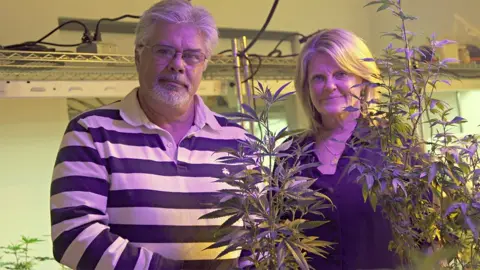 BBC
BBC
"It's the wild, wild west here," says Vic. "It's a gold rush, or a curse for Oklahoma, I don't know which one."
Chinese American cannabis farm owner "Aaron" does not want his real name used, but happily opens his gates to visitors. In his flip-flops and sweatpants, a cigarette always balanced on his lips or between his fingers, Aaron proudly shows off his weed empire.
For a man who just months earlier had zero experience growing marijuana, the fledgling operation is astonishing in its scale. The farm contains several warehouse-like buildings filled with countless cannabis plants. It's like a botanical garden, but with the ambience of an assembly line. About a dozen Chinese workers sit on small benches among the bushes, carefully pruning the adolescent plants.

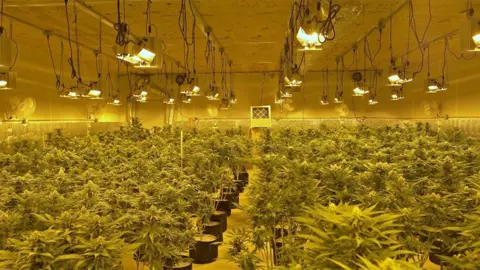 BBC
BBC
Aaron's employees stay in a house just down the road, a couple of rambunctious puppies in the yard. That afternoon they were preparing to make a massive batch of fishball soup from fish they caught in a pond behind the property.
Aaron, too, hails from Fujian. He was smuggled into the US on a ship as a teenager decades ago, when illegal immigration from Fujian was rampant.
Life was tough in the first years. Aaron endured back-breaking work and harsh living conditions when working in restaurants across the country, in places like Maine and Ohio. He still vividly remembers the despair he felt, when he arrived at strange new cities with all his belongings in a backpack and no clue where he was.
"My only option was to bear hardship and not to complain," Aaron says in Mandarin. "If I had lost my job, I wouldn't know where I could go."
He learned English on the street, eventually obtained a green card, and went on to make his first pot of gold in the restaurant industry in Florida. He claims he once owned more than 30 restaurants there.

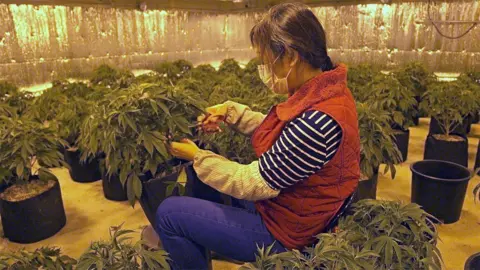 BBC
BBC
Aaron now employs workers with similar backgrounds to Xia's, who are relatively new to America and willing to take labour-intensive jobs to survive. But Aaron thinks things are much better than when he first arrived in the US, with mobile phones to keep in touch with family back home, a more established Asian immigrant network in the US and hence, greater leverage with the employers.
"I treat them as my grandpas and grandmas," he says with a big smile on his face. "The Chinese people are very adaptable. We find ways to survive in all sorts of situations."
That does not mean that life in Oklahoma for the recent transplants has been easy.
"When the police see Asian faces in an out-of-state car, they will order you to pull over," says Michael, claiming he has been pulled over three times in Oklahoma by police officers. "They inspected every little corner in my car."
Under federal and state laws, law enforcement officers can seize cash based only on the suspicion it was earned from or used to commit a crime. Michael says this is a big problem for an immigrant community accustomed to doing everything in cash - for example, he says he has never owned a credit or debit card in his 30 years living in America.
Matt Stacy, the cannabis lawyer, takes on several cases involving forfeited cash every week, in some instances, for tens of thousands of dollars.
"We have to prove over and over that the money that someone was lawfully carrying with them is actually their money." He believes the practice has a disproportionate impact on his Asian immigrant clients, many of whom don't speak English well.
"The fact is, this is an unbanked industry," Stacy says - as marijuana is not yet decriminalised federally, bank options are limited for cannabis entrepreneurs.
After the debacle in New Mexico, the Oklahoman farmers are even more concerned about the presumption by locals and law enforcement that their operations are not above board. And there are already signs of trouble. In late April, the Oklahoma Bureau of Narcotics raided a cannabis farm, which has a legal medical marijuana licence but allegedly sold large quantities of its product on the black market. Eleven people were taken into custody, who, the police say, are potential owners and workers from Taiwan and China, and do not speak English. A bill that requires licence holders to disclose any "foreign financial interest" in marijuana businesses is moving through the state legislature.

 BBC
BBC
Nevertheless, Irving Lin insists the majority of Asian farmers are complying with Oklahoma law.
"They are good people," Lin says. "They are doing nothing wrong. They need to take care of the family."
 BBC
BBCWhile Lin still sees a bright future in cannabis in Oklahoma, back in Shiprock the community is in disarray.
The farms now lie empty. Inside abandoned mobile homes and barely insulated plywood shacks, the contents of every cupboard, drawer and closet are strewn across the floors, likely the work of law enforcement searching for evidence. The air smells of sewage and rotting food. Clothes still hang in the closets. Toothbrushes sit beside sinks. Outside, empty bottles and Chinese cigarette packets tumble across the fallow fields.
"All we see is plastic. We see trash. We see dead marijuana plants," says Bea Redfeather. "That's what they left us with."

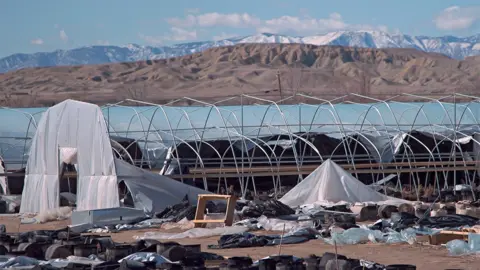 BBC
BBC
In the November 2020 election, Redfeather ran for San Juan Farm Board president and won, unseating Benally. She is sticking by her campaign promise to strip the 33 Navajo landowners of their farming permits, and trying to figure out how to start the huge cleanup. The Navajo Nation attorney general's office has also sued the landowners.
Seventeen of those farmers have banded together to form a new, pro-hemp farmers' association, claiming they "were unaware of hemp operator principal Dineh Benally's intentions to grow illegal crops". A lawyer representing the group says they may even sue for what they say was an overzealous law enforcement response that included pointing guns at elderly Navajo landowners.

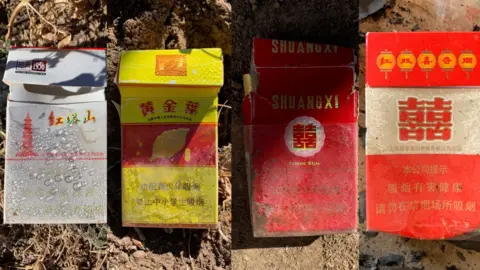 BBC
BBC
Benally has left Shiprock, where he is facing charges of conspiracy, aggravated assault and interfering with judicial proceedings.
Because a federal investigation by the DEA and FBI is still open, it's not clear how many migrant workers were in Shiprock, or whether charges for any of the farmers or investors are being considered. According to Sanchez, momentum is building behind a labour trafficking inquiry, thanks to cooperation from the Travel Inn workers.
Brandon Billie also no longer feels welcome in the Navajo Nation. Today, he works in health care in a nearby town, pulling long, late-night shifts. During the day, he sleeps in the back of his battered SUV in the parking lot. He has an apartment near Shiprock but stays away for his and his family's protection.

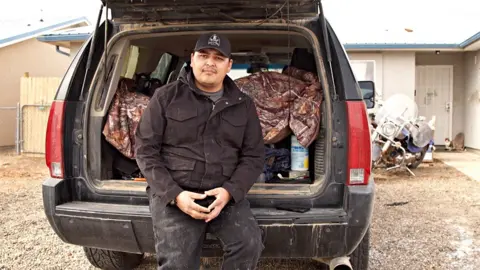 BBC
BBC
"Shiprock has changed so much," he says. "I just don't feel welcome no more."
Gone, too, are the dreams of travelling to China. He says he tried to stay in touch with his favourite workers, but one by one they stopped responding.
Xia's experience in Oklahoma was short and disappointing, as well. The flower trimming work never materialised, and she wound up working as a masseuse again. The friends who did make it on to the farms told her to stay away.
"The snow is very heavy and thick," they warned.
She decided to cut her losses and go back to LA.
In March, a gunman on a shooting spree in Atlanta, Georgia, killed eight people - six of them Asian women. The murderer targeted massage businesses similar to the ones Xia has worked in for years, and the victims included Korean and Chinese immigrants who, like her, travelled all over the country searching for work. The killings came after weeks of reported increases in hate crimes and violent attacks against Asian Americans, particularly women, across the US.
As a result, Xia no longer wants to work in spas, further narrowing her already scant job prospects. Even though she hasn't made the amount of money she was hoping to send home to her family, she's not sure how much longer she will stay in the US.
"I often hear about Chinese people getting beaten up. We remind each other to be careful," she says. "It's so scary. It's like living in terror."
After everything she'd been through, Xia says she's still happiest among the fan-leafed plants of the cannabis farms. A few months after her return to California, she finds work at an outdoor grow where the hours are long and the sun beats down on her back. The job is seasonal and sporadic, but anytime she can, Xia says she will be back on the farm.
"If you don't mind the hardship and tiredness," she says, "a day at the farm passes quickly."
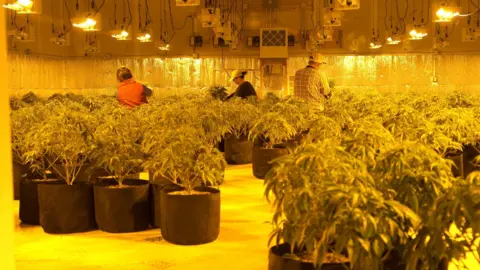 BBC
BBCAdditional reporting and photography by Xinyan Yu; illustration by Katie Horwich
